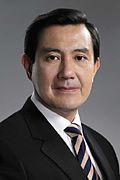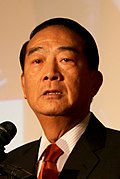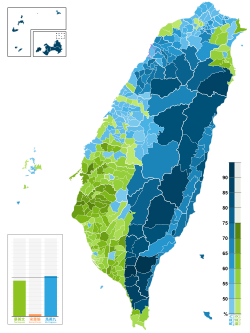Taiwan presidential election, 2012
|
|
|||||||||||||||||||||||||||||||||||||||
|
|||||||||||||||||||||||||||||||||||||||
|
|||||||||||||||||||||||||||||||||||||||
|
|
|||||||||||||||||||||||||||||||||||||||
|
Leaders in township-level units: Ma-Wu Ticket
Tsai-Su Ticket
|
|||||||||||||||||||||||||||||||||||||||
|
|||||||||||||||||||||||||||||||||||||||
| Taiwan presidential election, 2012 | |||
| Traditional Chinese | 第十三任中華民國總統副總統選舉 | ||
|---|---|---|---|
|
|||
| Transcriptions |
|---|
The election for the 13th-term President and Vice-President of the Republic of China was held in Taiwan on 14 January 2012. The election was held concurrently with legislative elections. It was the fifth direct election for the President of Taiwan. Prior to 1996, the President was elected by the ROC's National Assembly and not directly by the people.
Incumbent Ma Ying-jeou was re-elected as President with 51.6% of the vote. DPP challenger Tsai Ing-wen resigned her post as chairperson of the DPP following her election defeat.
The Kuomintang (KMT or Chinese Nationalist Party) ticket won a landslide victory in 2008 over the incumbent Democratic Progressive Party, with a 2.2 million vote margin on 58% of the valid votes.
The administration of Ma Ying-jeou has been more friendly in policy towards the People's Republic of China and also signed the Economic Cooperation Framework Agreement (ECFA), a preferential trade agreement between the governments of China (PRC) and Taiwan (ROC).
...
Wikipedia




